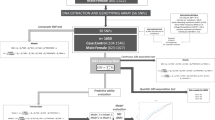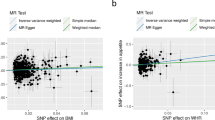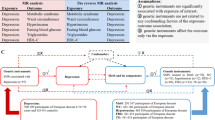Abstract
There is evidence that obesity-related disorders are increased among people with depression. Variation in the FTO (fat mass and obesity associated) gene has been shown to contribute to common forms of human obesity. This study aimed to investigate the genetic influence of polymorphisms in FTO in relation to body mass index (BMI) in two independent samples of major depressive disorder (MDD) cases and controls. We analysed 88 polymorphisms in the FTO gene in a clinically ascertained sample of 2442 MDD cases and 809 controls (Radiant Study). In all, 8 of the top 10 single-nucleotide polymorphisms (SNPs) showing the strongest associations with BMI were followed-up in a population-based cohort (PsyCoLaus Study) consisting of 1292 depression cases and 1690 controls. Linear regression analyses of the FTO variants and BMI yielded 10 SNPs significantly associated with increased BMI in the depressive group but not the control group in the Radiant sample. The same pattern was found in the PsyCoLaus sample. We found a significant interaction between genotype and affected status in relation to BMI for seven SNPs in Radiant (P<0.0057), with PsyCoLaus giving supportive evidence for five SNPs (P-values between 0.03 and 0.06), which increased in significance when the data were combined in a meta-analysis. This is the first study investigating FTO and BMI within the context of MDD, and the results indicate that having a history of depression moderates the effect of FTO on BMI. This finding suggests that FTO is involved in the mechanism underlying the association between mood disorders and obesity.
This is a preview of subscription content, access via your institution
Access options
Subscribe to this journal
Receive 12 print issues and online access
$259.00 per year
only $21.58 per issue
Buy this article
- Purchase on Springer Link
- Instant access to full article PDF
Prices may be subject to local taxes which are calculated during checkout

Similar content being viewed by others
References
Murray CJ, Lopez AD . Global mortality, disability, and the contribution of risk factors: Global Burden of Disease Study. Lancet 1997; 349: 1436–1442.
Farmer A, Korszun A, Owen MJ, Craddock N, Jones L, Jones I et al. Medical disorders in people with recurrent depression. Br J Psychiatry 2008; 192: 351–355.
Moussavi S, Chatterji S, Verdes E, Tandon A, Patel V, Ustun B . Depression, chronic diseases, and decrements in health: results from the World Health Surveys. Lancet 2007; 370: 851–858.
Patten SB, Beck CA, Kassam A, Williams JV, Barbui C, Metz LM . Long-term medical conditions and major depression: strength of association for specific conditions in the general population. Can J Psychiatry 2005; 50: 195–202.
Loos RJ, Bouchard C . FTO: the first gene contributing to common forms of human obesity. Obes Rev 2008; 9: 246–250.
Dina C, Meyre D, Gallina S, Durand E, Korner A, Jacobson P et al. Variation in FTO contributes to childhood obesity and severe adult obesity. Nat Genet 2007; 39: 724–726.
Frayling TM, Timpson NJ, Weedon MN, Zeggini E, Freathy RM, Lindgren CM et al. A common variant in the FTO gene is associated with body mass index and predisposes to childhood and adult obesity. Science 2007; 316: 889–894.
Scuteri A, Sanna S, Chen WM, Uda M, Albai G, Strait J et al. Genome-wide association scan shows genetic variants in the FTO gene are associated with obesity-related traits. PLoS Genet 2007; 3: e115.
Thorleifsson G, Walters GB, Gudbjartsson DF, Steinthorsdottir V, Sulem P, Helgadottir A et al. Genome-wide association yields new sequence variants at seven loci that associate with measures of obesity. Nat Genet 2009; 41: 18–24.
Willer CJ, Speliotes EK, Loos RJ, Li S, Lindgren CM, Heid IM et al. Six new loci associated with body mass index highlight a neuronal influence on body weight regulation. Nat Genet 2009; 41: 25–34.
Gerken T, Girard CA, Tung YC, Webby CJ, Saudek V, Hewitson KS et al. The obesity-associated FTO gene encodes a 2-oxoglutarate-dependent nucleic acid demethylase. Science 2007; 318: 1469–1472.
Cecil JE, Tavendale R, Watt P, Hetherington MM, Palmer CN . An obesity-associated FTO gene variant and increased energy intake in children. N Engl J Med 2008; 359: 2558–2566.
Wardle J, Llewellyn C, Sanderson S, Plomin R . The FTO gene and measured food intake in children. Int J Obes (Lond) 2009; 33: 42–45.
Wardle J, Carnell S, Haworth CM, Farooqi IS, O’Rahilly S, Plomin R . Obesity associated genetic variation in FTO is associated with diminished satiety. J Clin Endocrinol Metab 2008; 93: 3640–3643.
Cohen-Woods S, Gaysina D, Craddock N, Farmer A, Gray J, Gunasinghe C et al. Depression Case Control (DeCC) Study fails to support involvement of the muscarinic acetylcholine receptor M2 (CHRM2) gene in recurrent major depressive disorder. Hum Mol Genet 2009; 18: 1504–1509.
Farmer A, Breen G, Brewster S, Craddock N, Gill M, Korszun A et al. The Depression Network (DeNT) Study: methodology and sociodemographic characteristics of the first 470 affected sibling pairs from a large multi-site linkage genetic study. BMC Psychiatry 2004; 4: 42.
McGuffin P, Knight J, Breen G, Brewster S, Boyd PR, Craddock N et al. Whole genome linkage scan of recurrent depressive disorder from the depression network study. Hum Mol Genet 2005; 14: 3337–3345.
Uher R, Huezo-Diaz P, Perroud N, Smith R, Rietschel M, Mors O et al. Genetic predictors of response to antidepressants in the GENDEP project. Pharmacogenomics J 2009; 9: 225–233.
Wing JK, Babor T, Brugha T, Burke J, Cooper JE, Giel R et al. SCAN. Schedules for clinical assessment in neuropsychiatry. Arch Gen Psychiatry 1990; 47: 589–593.
McGuffin P, Katz R, Aldrich J . Past and present state examination: the assessment of ‘lifetime ever’ psychopathology. Psychol Med 1986; 16: 461–465.
Beck AT, Steer RA . Internal consistencies of the original and revised Beck Depression Inventory. J Clin Psychol 1984; 40: 1365–1367.
Firmann M, Mayor V, Vidal PM, Bochud M, Pecoud A, Hayoz D et al. The CoLaus study: a population-based study to investigate the epidemiology and genetic determinants of cardiovascular risk factors and metabolic syndrome. BMC Cardiovasc Disord 2008; 8: 6.
Preisig M, Waeber G, Vollenweider P, Bovet P, Rothen S, Vandeleur C et al. The PsyCoLaus study: methodology and characteristics of the sample of a population-based survey on psychiatric disorders and their association with genetic and cardiovascular risk factors. BMC Psychiatry 2009; 9: 9.
Nurnberger Jr JI, Blehar MC, Kaufmann CA, York-Cooler C, Simpson SG, Harkavy-Friedman J et al. Diagnostic interview for genetic studies. Rationale, unique features, and training. NIMH Genetics Initiative. Arch Gen Psychiatry 1994; 51: 849–859.
Lewis CM, Ng MY, Butler AW, Cohen-Woods S, Uher R, Pirlo K et al. Genome-wide association study of major recurrent depression in the UK population. Am J Psychiatry 2010; 167: 949–957.
Galwey NW . A new measure of the effective number of tests, a practical tool for comparing families of non-independent significance tests. Genet Epidemiol 2009; 33: 559–568.
Purcell S, Neale B, Todd-Brown K, Thomas L, Ferreira MA, Bender D et al. PLINK: a tool set for whole-genome association and population-based linkage analyses. Am J Hum Genet 2007; 81: 559–575.
Kutalik Z, Johnson T, Bochud M, Mooser V, Vollenweider P, Waeber G et al. Methods for testing association between uncertain genotypes and quantitative traits. Biostatistics 2010; 0: 1–17.
Browning BL, Browning SR . A unified approach to genotype imputation and haplotype-phase inference for large data sets of trios and unrelated individuals. Am J Hum Genet 2009; 84: 210–223.
Barry D, Pietrzak RH, Petry NM . Gender differences in associations between body mass index and DSM-IV mood and anxiety disorders: results from the National Epidemiologic Survey on Alcohol and Related Conditions. Ann Epidemiol 2008; 18: 458–466.
Desai RA, Manley M, Desai MM, Potenza MN . Gender differences in the association between body mass index and psychopathology. CNS Spectr 2009; 14: 372–383.
Scott KM, McGee MA, Wells JE, Oakley Browne MA . Obesity and mental disorders in the adult general population. J Psychosom Res 2008; 64: 97–105.
Andreasen CH, Stender-Petersen KL, Mogensen MS, Torekov SS, Wegner L, Andersen G et al. Low physical activity accentuates the effect of the FTO rs9939609 polymorphism on body fat accumulation. Diabetes 2008; 57: 95–101.
Hinney A, Nguyen TT, Scherag A, Friedel S, Bronner G, Muller TD et al. Genome wide association (GWA) study for early onset extreme obesity supports the role of fat mass and obesity associated gene (FTO) variants. PLoS One 2007; 2: e1361.
Ng MC, Park KS, Oh B, Tam CH, Cho YM, Shin HD et al. Implication of genetic variants near TCF7L2, SLC30A8, HHEX, CDKAL1, CDKN2A/B, IGF2BP2, and FTO in type 2 diabetes and obesity in 6719 Asians. Diabetes 2008; 57: 2226–2233.
Renstrom F, Payne F, Nordstrom A, Brito EC, Rolandsson O, Hallmans G et al. Replication and extension of genome-wide association study results for obesity in 4923 adults from northern Sweden. Hum Mol Genet 2009; 18: 1489–1496.
Tan JT, Dorajoo R, Seielstad M, Sim XL, Ong RT, Chia KS et al. FTO variants are associated with obesity in the Chinese and Malay populations in Singapore. Diabetes 2008; 57: 2851–2857.
Holsboer F . The corticosteroid receptor hypothesis of depression. Neuropsychopharmacology 2000; 23: 477–501.
Su AI, Wiltshire T, Batalov S, Lapp H, Ching KA, Block D et al. A gene atlas of the mouse and human protein-encoding transcriptomes. Proc Natl Acad Sci USA 2004; 101: 6062–6067.
Kessler RC, Berglund P, Demler O, Jin R, Koretz D, Merikangas KR et al. The epidemiology of major depressive disorder: results from the National Comorbidity Survey Replication (NCS-R). JAMA 2003; 289: 3095–3105.
Acknowledgements
We thank those who agreed to participate in the studies and the many colleagues who contributed to collection and phenotypic characterisation of the clinical samples, to genotyping and to statistical analyses. This study was funded by the Medical Research Council, UK and GlaxoSmithKline (G0701420). The GENDEP study was funded by a European Commission Framework 6 grant, EC Contract Ref.: LSHB-CT-2003-503428. This research was supported by a Marie Curie Intra European Fellowship within the 7th European Community Framework Programme. Dr Cohen-Woods and Dr Schosser were both funded by Postdoctoral Fellowships from the National Institute for Health Research (NIHR) specialist Biomedical Research Centre for Mental Health. Dr Rucker is funded by a Research Training Fellowship from the Wellcome Trust. The CoLaus/PsyCoLaus study was supported by grants from the Swiss National Science Foundation (#3200B0–105993, #3200B0-118308, 33CSC0-122661) and from GlaxoSmithKline. S Bergmann is grateful for financial support from the Giorgi-Cavaglieri Foundation, the Swiss National Science Foundation (Grant #3100AO-116323/1), the Swiss Institute of Bioinformatics and the European Framework Project 6 (through the AnEuploidy and EuroDia projects).
Author information
Authors and Affiliations
Corresponding author
Ethics declarations
Competing interests
Aitchison, Farmer and McGuffin have received consultancy fees and honoraria for participating in expert panels for pharmaceutical companies including GlaxoSmithKline. Aitchison declares interests through the advisory boards for Johnson & Johnson, Lundbeck, Roche Diagnostics and Bristol-Myers Squibb; membership of Bristol-Myers Squibb UK Steering group 2003 to present; consultancy work for Roche Diagnostics, Johnson & Johnson Pharmaceutical Research and Development, Lundbeck, and Bristol-Myers Squibb Pharmaceuticals Limited; grants awarded by Johnson & Johnson Pharmaceutical Research and Development, Bristol-Myers Squibb Pharmaceuticals Limited, and E Merck Pharmaceuticals. Maier is member of the Advisory Boards/has received fees for speaking from: Lilly, Lundbeck. Tozzi was full-time employee of GlaxoSmithKline at the time when the work was performed. All other authors declare no conflicts of interest.
Additional information
Supplementary Information accompanies the paper on the Molecular Psychiatry website
PowerPoint slides
Rights and permissions
About this article
Cite this article
Rivera, M., Cohen-Woods, S., Kapur, K. et al. Depressive disorder moderates the effect of the FTO gene on body mass index. Mol Psychiatry 17, 604–611 (2012). https://doi.org/10.1038/mp.2011.45
Received:
Revised:
Accepted:
Published:
Issue Date:
DOI: https://doi.org/10.1038/mp.2011.45
Keywords
This article is cited by
-
Fat mass and obesity-associated protein regulates RNA methylation associated with depression-like behavior in mice
Nature Communications (2021)
-
Ischemia-related changes of fat-mass and obesity-associated protein expression in the gerbil hippocampus
Metabolic Brain Disease (2020)
-
Fat mass and obesity-associated (FTO) rs9939609 polymorphism modifies the relationship between body mass index and affective symptoms through the life course: a prospective birth cohort study
Translational Psychiatry (2018)
-
The genetic overlap between mood disorders and cardiometabolic diseases: a systematic review of genome wide and candidate gene studies
Translational Psychiatry (2017)
-
Influence of depression on genetic predisposition to type 2 diabetes in a multiethnic longitudinal study
Scientific Reports (2017)



